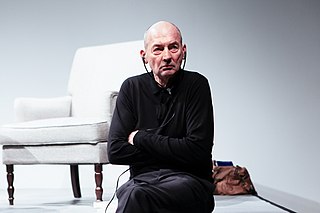
Remment Lucas Koolhaas is a Dutch architect, architectural theorist, urbanist and Professor in Practice of Architecture and Urban Design at the Graduate School of Design at Harvard University. He is often cited as a representative of Deconstructivism and is the author of Delirious New York: A Retroactive Manifesto for Manhattan.
The Pearl District is an area of Portland, Oregon, formerly occupied by warehouses, light industry and railroad classification yards and now noted for its art galleries, upscale businesses and residences. The area has been undergoing significant urban renewal since the mid-1980s when it was reclassified as mixed use from industrial, including the arrival of artists, the removal of a viaduct and construction of the Portland Streetcar. It now consists of industrial building conversion to offices, high-rise condominiums and warehouse-to-loft conversions.

The Seattle Central Library is the flagship library of the Seattle Public Library system. The 11-story glass and steel building in the downtown core of Seattle, Washington was opened to the public on May 23, 2004. Rem Koolhaas and Joshua Prince-Ramus of OMA/LMN were the principal architects, and Magnusson Klemencic Associates was the structural engineer with Arup. Arup also provided mechanical, electrical, and plumbing engineering, as well as fire/life safety, security, IT and communications, and audio visual consulting. Hoffman Construction Company of Portland, Oregon, was the general contractor.
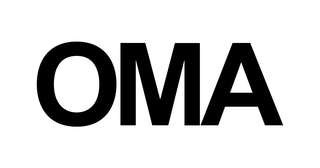
The Office for Metropolitan Architecture (OMA) is an international architectural firm with offices in Rotterdam, New York, Hong Kong, Doha, and Australia. The firm is currently led by eight partners - Rem Koolhaas, Reinier de Graaf, Ellen van Loon, Shohei Shigematsu, Iyad Alsaka, Chris van Duijn, Jason Long, and managing partner and architect David Gianotten.
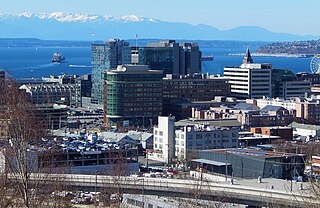
SoDo is a neighborhood in Seattle, Washington, that makes up part of the city's Industrial District. It is bounded on the north by South King Street, beyond which is Pioneer Square; on the south by South Spokane Street, beyond which is more of the Industrial District; on the west by the Duwamish River, across which is West Seattle; and on the east by Metro Transit's Downtown Seattle Transit Tunnel and SoDo Busway, beyond which is the International District and the rest of the Industrial District.
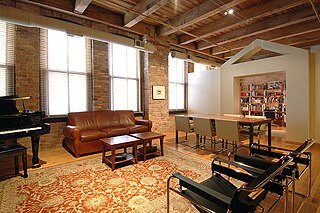
A loft is a building's upper storey or elevated area in a room directly under the roof, or just an attic: a storage space under the roof usually accessed by a ladder. A loft apartment refers to large adaptable open space, often converted for residential use from some other use, often light industrial. Adding to the confusion, some converted lofts themselves include upper open loft areas.

The Crossroads is a neighborhood within Greater Downtown with a population of 7,491. It is centered at approximately 19th Street and Baltimore Avenue, directly south of the Downtown Loop and north of Crown Center. It is the city's main art gallery district and center for the visual arts. Dozens of galleries are located in its renovated warehouses and industrial buildings. It is also home to numerous restaurants, housewares shops, architects, designers, an advertising agency, and other visual artists. The district also has several live music venue.

Lorillard Tobacco Company was an American tobacco company that marketed cigarettes under the brand names Newport, Maverick, Old Gold, Kent, True, Satin, and Max. The company had two operating segments: cigarettes and electronic cigarettes.

The Arts District is a neighborhood on the eastern edge of Downtown Los Angeles, California in the United States. The city community planning boundaries are Alameda Street on the west which blends into Little Tokyo, First Street on the north, the Los Angeles River to the east, and Violet Street on the south. Largely composed of industrial buildings dating from the early 20th century, the area has recently been revitalized, and its street scene slowly developed in the early 21st century. New art galleries have increased recognition of the area amidst the downtown, which is known for its art museums.
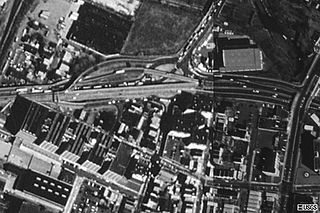
Marion is a section of Jersey City in Hudson County, in the U.S. state of New Jersey.
Madelon Vriesendorp is a Dutch artist, painter, sculptor and art collector. She was married to Rem Koolhaas and best known as one of the co-founders of the Office of Metropolitan Architecture (OMA) in the early 1970s. Vriesendorp would often create visuals and graphics for OMA in the early years.
Located at the University of Kentucky in Lexington, the College of Design encompasses the School of Architecture, the School of Interior Design, and the Department of Historic Preservation.

The Fort Point Channel Historic District is an historic district located along Congress, Summer and A streets in South Boston on the south side of Fort Point Channel.

The Powerhouse Arts District is a historic warehouse district in Downtown Jersey City, New Jersey, United States, on the water front of the Hudson River. Its name derives from the unused generating station Hudson and Manhattan Railroad Powerhouse, a historic Victorian-era power plant that was renovated into an arts center. The area was once home to large industrial operations, which gradually left the district during the 20th century, leaving large derelict buildings that attracted artists drawn to the large, affordable loft spaces.
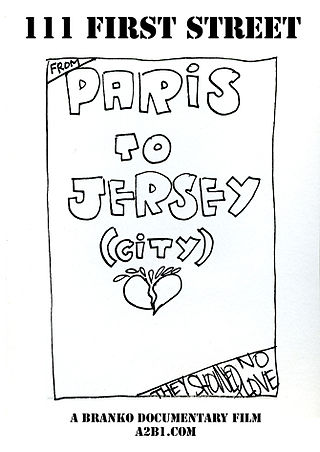
111 First Street. From Paris to Jersey City, they showed no love. is a 2012 documentary film, directed by Branko, starring some of the artists of an Art Center and residence located at 111 First Street, Jersey City, New Jersey. It is the fifth feature-length documentary film created by independent filmmaker Branko.
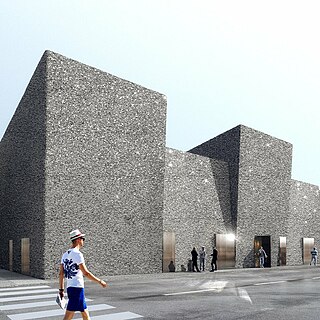
Alserkal Avenue is an industrial compound hosting warehouses in the industrial zone of Al Quoz, in Dubai. The area is an arts and culture district for Dubai with lineup of galleries, facilities and platforms, such as Alserkal Avenue that houses residencies for local and global artists. In March 2017, Alserkal Avenue inaugurated Concrete, its new space in the Avenue and the first project to be completed in the United Arab Emirates by the Office for Metropolitan Architecture (OMA), founded by Pritzker Architecture Prize Laureate Rem Koolhaas.

Fondazione Prada, co-chaired by Miuccia Prada and Patrizio Bertelli since 1995, is an institution dedicated to contemporary art and culture. From 1993 to 2010, the Fondazione has organised 24 solo shows at its exhibition spaces in Milan, conceived as dialogues with acclaimed contemporary artists. In 2015, the Fondazione Prada opened a new, permanent facility in Milan.
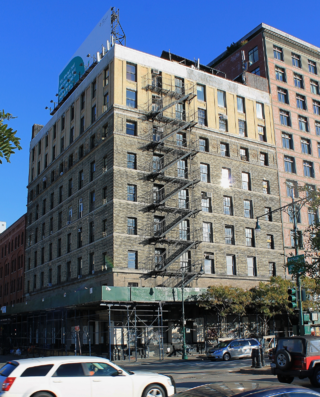
The Great Atlantic and Pacific Tea Company (A&P) Warehouse, located at 67 Vestry Street, is a historic building in the Tribeca section of Lower Manhattan in New York City. Originally a storage building, it was later converted to residential use and has since been historically linked to the New York City arts scene.

Factory International runs Manchester International Festival and operates Aviva Studios, a cultural space in Manchester, England.

















